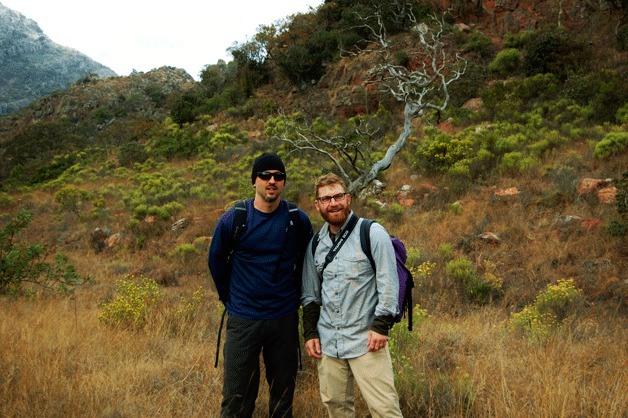While some may spend their sleepless nights counting sheep, Bainbridge High School Advanced Placement Environmental Science teacher Jason Uitvlugt prefers a more exotic quarry.
He counts leopards.
While giant cats may not be the most sleep-inducing choice, 40 winks was never really what Uitvlugt was looking for.
BHS teachers Uitvlugt and Advanced Placement Statistics teacher Brad Lewis recently returned from a three-week-long research project, where they worked closely with volunteers and scientists from the conservation group Earthwatch to study the effects of humans on the endangered species, including leopards, around the Lajuma Research Centre in South Africa.
They presented the lessons they learned there, and how they are applying them to the work done in their classrooms, at a lecture titled “Learning From Africa” in the BHS Commons earlier this week.
“I was surprised how much it actually applied to what we both do,” said Jason Uitvlugt, BHS AP Environmental Science teacher. “It’s like they made the trip for us, whi ch was great because before you leave you just don’t know how it’s going to work.”
ch was great because before you leave you just don’t know how it’s going to work.”
AP Statistics teacher Brad Lewis agreed.
“I can say ‘Oh yeah, they use this out there all the time,’ but to know exactly the real world applications of what we teach is very important for me as a teacher,” Lewis said.
Lewis was one of only 15 teachers from around the country to win a Hilton Honors Teacher Treks Travel Grant, which provides the chosen educators with a chance to go to a destination of their choosing to experience first-hand the subject they teach.
That, along with additional funding from the Bainbridge School Foundation and other sources, allowed the two to make the trip.
The ultimate goal of the program is the enhancement of the classroom experience by allowing the teachers to bring back what they do and see to their students.
In the case of Lewis and Uitvlugt, they had a lot to bring back.
The two spent their trip assisting Earthwatch researchers with predator tracking, measuring and cataloging vegetation plots, camera trapping, primate movement study and the improvement of local environmental education.
While they admittedly found different aspects of the project more interesting, Lewis was fascinated with the randomly selected points of study and the data recording techniques.
Uitvlugt delighted in identifying and observing various rare species, and they both agree that the experience was the perfect combination of their fields.
They found it so beneficial, in fact, that they are returning this summer with 15 BHS students to give them a first-hand look at the practical applications of their studies.
“For high school students to be able to work with researchers on that level is really unique,” Uitvlugt said.
Though the spots available for the trip this summer have been filled already, the teachers advise any students interested in a possible second trip in 2015 to take both AP classes before then to verify an interest and aptitude in those areas.

